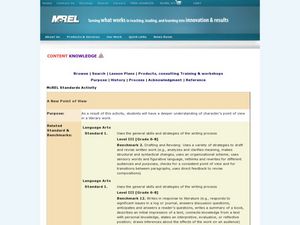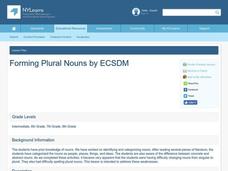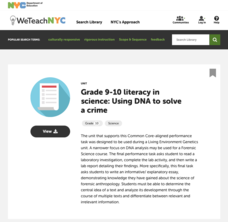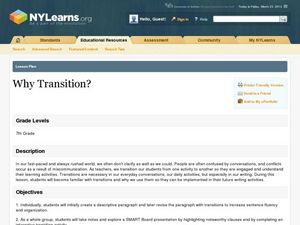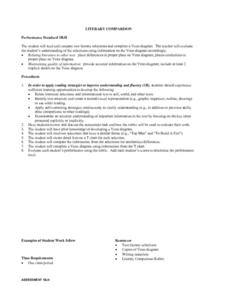Curated OER
Newbery Award Winners
Sixth graders select a book from the Newbery list and read it. They write a short summary of the book without giving away the ending and then research the book's author. They write a book review and, finally, incorporate all of this onto...
Curated OER
Fact vs. Opinion (Part II)
How can you tell the difference between fact and opinion? Using newspapers, learners determine which articles contain statements of fact, and which articles reflect the writer's opinion. The lesson plan includes a discussion format and a...
Khaled Hosseini Found
Lesson One: Exploration of The Kite Runner Graphic Novel
What is a graphic novel? How does it differ from a traditional novel? These questions launch a discussion of Fabio Celoni and Mirka Andolfo's graphic novel adaptation of The Kite Runner. Through a series of literature circle discussions,...
Curated OER
A New Point of View
Analyze point of view and how it affects a literary work with this lesson. Middle schoolers create a written piece that focuses on point of view. They review the literary term "point of view," and explore examples of the term in text....
Curated OER
Connectives
Using connectives and conjunctions is an easy way to vary sentence structure. Third graders review the given connectives, then use them to combine two simple sentences. The second section allows learners to use more words and phrases as...
Curated OER
Guide Word Sentences
Learners write sentences using dictionary guide words, putting two guide words from the same page in the same sentence. They demonstrate creative-writing and vocabulary skills to write sentences using dictionary guide words.
Curated OER
Mayan Myths/Folktales
Middle schoolers work on summarizing a story, and they determine if it is a legend, a myth, or a fable. Working in groups to read and summarize stories, they then list evidence whether the tale is a myth, fable, or legend. They present...
Curated OER
Forming Plural Nouns
Everyone knows that a noun is a person, place, thing, or idea - but what happens when you have people, places, things, or ideas? Use this SMART board activity to guide your class through plural nouns. Several activities, including making...
Curated OER
"A Boy and a Man" from Banner in the Sky by James Ramsey Ullman
A great resource for chapter 2 of Banner in the Sky by James Ramsey Ullman, this activity asks learners to respond to a series of lower- and higher-level questions using complete sentences following a class discussion. Pupils are asked...
New York City Department of Education
Grade 9-10 Literacy in Science: Using DNA to Solve a Crime
Scholars become detectives and use science to solve a crime! A complete unit introduces DNA and includes hands-on activities that have learners model DNA and extract it from different food types. A culminating activity challenges...
Curated OER
Parts of the Plot: Constructing A Plot Diagram
After reading "The King of Mazy May" by Jack London, learners reinforce their literary analysis skills in this SMART board activity. The provided SMART board file allows themto define elements of a short story, and then add it to the...
Curated OER
Why Transition?
Help your class transition into better writers with this lesson, which guides them through the process of adding transitions to increase sentence fluency and organization. The activity is designed for a classroom with a SMART board, but...
Appalachian State University
Effective Feedback
Use this well-developed class period to introduce your junior high learners as to how to provide effective feedback concerning their classmates' writing. The plan includes a warm-up, review, introduction, guided and independent practice,...
Curated OER
Where Do We Begin?
Primary learners grasp sequence of events by discussing morning routines and reviewing the story of Little Red Riding Hood. They explore the necessity of correct order of events. As a class, create a story with a beginning, middle, and...
Curated OER
Literary Comparison
Compare and contrast two pieces of literature with this lesson. With the use of a Venn diagram, pupils make connections between literature and real-life situations. They practice skills of surveying a text looking for important details,...
Houghton Mifflin Harcourt
Animal Habitats: Extra Support Lessons (Theme 4)
The activities and exercises in this packet, the third in the series of support materials for the Houghton Mifflin Harcourt thematic units on animal habitats, are designed for learners who need extra support with the basic concepts of...
Novelinks
The Devil’s Arithmetic: QAR Strategy
Asking questions about the text is an important way for kids to become critical readers. Use a QAR activity based on The Devil's Arithmetic to help learners decipher between questions that are right there, between the author and the...
1 plus 1 plus 1 equals 1
I Can Read! Sight Words Set #18
Identify four sight words with an extensive reading packet. After kids learn the words under, new, was, and be, they work on tracing and finding the words in fun new ways.
Curated OER
The News Behind the Story
What a fun way to analyze plot, setting, and character. Learners review story elements, read a short fictional story, then turn the events of that story into a headlining news paper article. Not only does this lesson plan engage critical...
Curated OER
Reading Questions: Alex Haley's "My Furthest Back Person: The African"
Based on Alex Haley's moving essay "My Furthest Back Person: The African," these 11 questions support comprehension and prepare readers for discussion of the text. Use this tool, and the essay, as a nonfiction addition to units on...
Worksheet Web
Interrogatives and Auxiliary Verbs
Interrogatives—who, what, where, when, why, and how—are the focus of a grammar worksheet that reinforces writing questions and using auxiliary verbs.
Skills USA
Personal Growth and the Personal Leadership Inventory
What are employers looking for in prospective employees? Career-minded high schoolers examine their strongest technical skills as well as important 21st century skills, including leadership, empathy, clear communication, working well...
Curated OER
Writing Fables
Young scholars write their own fables. In this writing fables lesson, students use handheld computers to write a fable. The class designs a spreadsheet to organize common elements of fables. Young scholars also edit each others' work.
Worksheet Web
Heteronyms
Challenge scholars to identify and use heteronyms in a sentence with a two-page activity designed to boost grammar skills.





